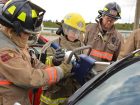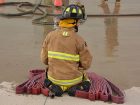
Features
Training
Trainer’s Corner May 2017: How to train for higher achievements
Today’s training officer needs to be a bit of a miracle worker to get the required fire services training objectives squeezed into a tight, 42-week schedule. As I was writing this column, our department was in its second full weekend of first responder training. In addition to the 38-hour first-responder course, we had a four-hour CPR course, which in itself was double our regularly scheduled practice time.
April 19, 2017
By Ed Brouwer
I heard a joke about an old cowboy (I can relate!) who applied for health insurance. The agent asked if the cowboy had experienced any accidents during the previous year.
The cowboy replied, “No, but I was bitten by a rattlesnake and a horse kicked me in the ribs. That laid me up for a while.”
The agent said, “Well, weren’t those accidents?”
“No,” replied the cowboy. “They did it on purpose.”
The punch line resonated with me and serves as a reminder of how we should train in the fire service. We must never leave training to chance; our training must be purpose-driven. That purpose must be training for achievement. Achievement, according to various dictionaries, means a thing done successfully, typically by effort, courage, or skill.
I’ve been wrong before, but I believe that learning by experience alone is a slow process and may never effectively equip your members for the job. The poet Matthew Arnold said, “We do not what we ought, what we ought not, we do, and lean upon the thought that chance will bring us through.” Although penned in the late 1800s these words still echo a warning, faintly reverberating within the walls of fire departments and training facilities.
For a training program to be effective, it must instill confidence in our firefighters so they are able to perform under stressful conditions. That is our mission as instructors. This must not be left to chance.
Training for achievement motivates our trainees, because it is based on personal successes rather than merely following the guidelines. What’s more, training for achievement will generate even more interest for all your members, because the trainers also have an individual interest in the achievements of their students. If your training purpose is to build confidence in your members, you will find that by training for achievement, your members’ performance standard increases.
Another area of concern is the lack of senior officer involvement in training programs. In a volunteer department, the chief and deputy should be involved with their staff throughout scenarios and evaluations. How else will they know what their department is truly capable of?
My son Aaron, a firefighter in Prince George, B.C., likened this to a basketball team, in which the assistant coach runs every practice, while the head coach comes out only for the games. The coach technically leads the team, but has no idea of each player’s strengths and weaknesses.
In most cases when a volunteer department responds to a call, the chief becomes the incident commander and that is why it is paramount that the chief knows the firefighters under his or her command. In order for the firefighters to feel confident under the IC’s leadership, there has to be a relationship on the training floor.
When we work with multiple crews on a wildfire, the B.C. Ministry of Forests sometimes sends us a desk jockey to act as incident commander (IC). I have no problem with this as long as the IC doesn’t mind answering a few questions before I follow orders, questions such as: When is the last time you were out in the field? What training do you have? Have you fought in these conditions before? What experience do you have with urban interface fires? I don’t think it is unrealistic for me to ask those questions – I’d rather find out the answers in the briefing rather than during the debriefing.
I respect my fire chief, Roy Terashita. He not only attends every practice session, he participates in them. Terashita takes all of the exams and strives for excellence in his leadership.
The training officer’s mission is to develop firefighters who will consistently achieve positive results on the fire ground. This is what I mean by purpose driven; it does not happen by chance.
When I was a rookie training officer, I was taught that a training program needs to focus on skill development, maintenance and improvement. That sounded like a good plan at the time. However, over the years I have discovered that skill development is only half the battle.
Training must go beyond merely imparting knowledge. Trainees need to develop confidence and trust in themselves so they can perform at their best under stressful conditions.
Training is the key to the success or failure of a fire department. The challenge is yours and I know you can do this. Remember that you are not alone. There is a vast network of trainers/instructors who can help you reach your goals. Strive for excellence and train with a purpose. Remember: lives depend on it.
Ed Brouwer is the chief instructor for Canwest Fire in Osoyoos, B.C., and training officer for Greenwood Fire and Rescue. He is also a fire warden with the B.C. Ministry of Forests, a wildland urban interface fire-suppression instructor/evaluator and an ordained disaster-response chaplain. Ed has written Trainer’s Corner for 15 of his 27 years in the fire service. Contact Ed at ebrouwer@canwestfire.org
Print this page
Advertisement
- Safe Harbour: Build resilience with yoga
- Leading Edge May 2017: British Columbia Playbook receives support

